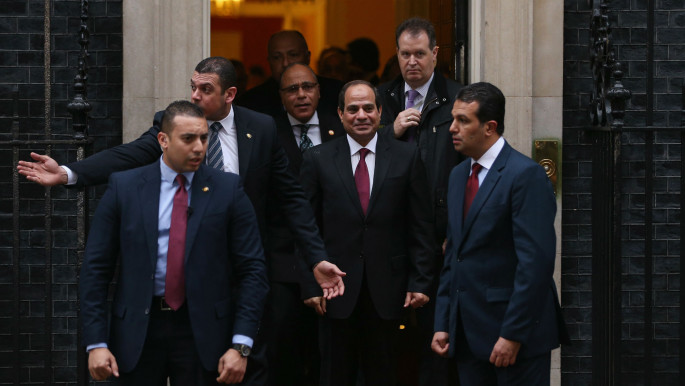The UK explores new markets and trade deals in Africa to replace the EU
Now the good news is that the UK is free to achieve any trade deals without referring to Brussels or Luxemburg. The UK's next step is to secure new markets and sign new economic and investments deals with non-European partners.
The UK-Africa Investment Summit, which took place on January 20, was organised by the British Government to explore the investment opportunities in the continent – home to 8 of the 15 fastest growing economies in the world.
The Summit, which was the largest annual investment event held for the eighth time outside Africa was attended by Representatives from 21 African states. A number of businessmen leaders as well from the two regions were also among the attendees.
It is necessary now to forge a new set of international alliances and trading deals with new markets be it the US, Australia, Canada or Africa.
British Prime Minister Boris Johnson and Egyptian President Abdel Fattah al-Sisi, in his capacity as the president of the African Union, inaugurated the summit. Speeches were delivered and enthusiastic ideas were pumped as hopes were high that London will become Africa's new developer. For the UK, strengthening non-European relations has now become a necessity.
Officials from the British sides included Alok Sharma the International Development Secretary, Elizabeth Truss the Trade Secretary, Andrea Leadsom the Business Secretary, and Dominic Raab the Foreign Secretary.
The sentence that said and resonated with many at the summit is that the UK is now open for business in Africa.
"The UK was a one-stop shop for investment and business... we're also very much the partner of today, of tomorrow and decades to come," Boris Johnson said in his opening address.
Sisi spoke next and called on Britain to be further engaged in Egyptian development plans in various fields, to double British investments in Egypt and to advance economic cooperation between the two sides.
"Despite the enormity of challenges and their intertwined effects on the African continent, I can say that there are promising and diversified opportunities for the continent's partners, which makes Africa one of the most important destinations for international business institutions," Sisi elaborated.
The closing speech of what was described as a 'historic day', was delivered by Alok Sharma, "We have heard from Heads of State and Governments, as well as young entrepreneurs, tech experts and business leaders. And it is clear that everyone shares that ambition. We started the day with £6.5 billion of deals and have ended with billions more. That is thanks to people in this room."
 |
We started the day with £6.5 billion of deals and have ended with billions more. That is thanks to people in this room |  |
However, the participation of Sisi at the summit angered human rights activists as well as some Egyptians living in the UK who oppose the Egyptian regime, citing gross human rights violations and corruption. Their presence was challenged by another small group supporting Sisi.
 |
|
| Read also: Morally bankrupt, Brexit Britain rolls out the red carpet for Egyptian dictator Sisi |
Acting UK director at Human Rights Watch, Benjamin Ward, said the decision sent "a terrible message to the country's embattled activists and calls into question the UK government's stated commitment to uphold human rights globally."
Read also: UK legal group seeks arrest warrant for Egypt's Sisi for 'murdering Morsi'
The protest was organised by the 'Egyptian Revolutionary Council' or what is known as "Egyptian opposition gathering abroad".
The protesters carried banners and placards calling for Sisi's trial for "killing Egyptian protesters" and for "detainees in prisons." Others held pictures of the ousted president Mohammed Morsi, who died last year in prison, after spending nearly six years in detention.
This demonstration comes in light of continuing calls for the arrest of Sisi during his visit to Britain – based on a lawsuit filed by British lawyers to the command of the "anti-terrorism" police in the capital, London – demanding the issuance of an arrest warrant against Sisi, on the background of accusations of torture and murder.
The challenges facing Africa
In the past 10 years, a higher number of people from the southern sphere have been moving towards the north in Europe through the Mediterranean Sea, with hundreds of thousands of people from Africa, the Middle East and South Asia, fleeing conflicts, utter destitution, poverty, political instability and wars.
For African migrants, Libya had always been the best available route and destination for many sub-Saharan Africans because of its employment opportunities and smuggling route to Europe onboard boats.
Thousands lost their lives trying to reach Europe with a big number of migrants from North African "Arab" countries braving the big waves of the sea to reach European shores in hope for a better life.
So, in light of this sad reality, it is not known if being 'more open to Africa' means Johnson will make sure no more economic migrants risk their lives at sea and if he pressures allied regimes to respect human rights and improve the livelihood of people under their rule.
Rather than establishing aid-based, donor-recipient relationship and grants, it's essential for countries with strong economy to build economic corporations and partnerships in order to improve the life standards among the African nations.
The UK-Africa Investment Summit, which was the first to be held in the UK, has laid the basis for new partnerships between Britain and African nations based on trade, investment, shared values and mutual interest.
As Brexit is round the corner, it's obvious that building on historical ties and forging new alliances is now more essential than ever.
Yousef Alhelou is a Palestinian journalist and political analyst from Gaza, based in London. He is a United Nations fellow and alumni, and served as a Reuters journalist fellow at the University of Oxford.
Follow him on Twitter: @YousefAlhelou



